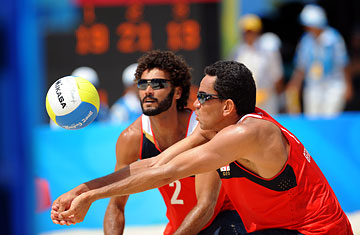
Georgia's Renato Gomes passes the ball during an Aug. 16 beach-volleyball event in Beijing
It might have seemed like patriotism gone wild when two members of Georgia's men's beach-volleyball team stitched the nicknames "Geor" and "Gia" onto their uniforms, spelling out the name of their team's besieged nation. But there's a twist: neither of the players is Georgian by birth — 2.04-m Renato Gomes and 1.92-m Jorge Terceiro are towering Brazilian imports recruited by Georgian President Mikheil Saakashvili for the sole purpose of playing for his country in the Olympics.
National pride always takes center stage at the Olympics, where the medals table measures a country's worth and the victors beam as they hear their national anthems. But what happens when the athletes don't know the lyrics — or even the language? Though they're required to hold Georgian citizenship to compete under Georgia's flag in the Olympics, the Brazilian-born athletes barely speak a word of Georgian and have no family ties to the former Soviet republic. In fact, they've only visited the country a few times — to pick up their passports and presumably to finalize their contracts. But that hasn't dampened their enthusiasm for their adopted country. When "Geor" and "Gia" advanced to the semifinals with a win over a Dutch duo on Aug. 18, the mop-haired Terceiro bounded into the stands to do a little Brazilian-style samba underneath the red-and-white Georgian flag.
More athletes than ever are competing in Beijing under flags (and, in many cases, names) different from the ones under which they were born, bending the very notion of national identity. For some observers, this growing trend is a symbol of how sport transcends national borders, giving athletes a chance to escape hardship, train with better coaches, or compete in sports that are saturated with talent back home. For others — including, in some cases, the Olympics' governing body — it can be a violation of the very spirit of the games. The International Olympic Committee (IOC) now requires a three-year waiting period between the time an athlete gets citizenship in a country and the time he or she can compete on its Olympic team. "What is not legitimate," Jacques Rogge, the IOC chief, said in 2004, "is when an athlete sells himself as a mercenary."
The gold medalists in recruiting foreign-born athletes are Qatar and Bahrain, tiny oil-rich Gulf states that have poached top runners from Kenya, Morocco, and Ethiopia. The effort took off in the 1990s, when Qatar began importing Bulgarian weight lifters, one of whom, Angel Popov, won a bronze medal in the 2000 Olympics under his adopted Arab name, Saif Saeed Asaad. Since then, Qatar and Bahrain have each shelled out millions of dollars to persuade athletes to change their citizenship, tossing in lucrative incentives for setting world records and bringing home Olympic gold.
Their generous cash-for-gold strategy may pay off this week. Moroccan-born star Rashid Ramzi, now running for Qatar, is a favorite to win the men's 1,500-m race, though he'll be challenged by two Kenyans running for Qatar and Bahrain under new Arab names. Two other medal favorites going into the Games' final weekend are Bahrain's Ethiopian-born 1,500-m specialist Maryam Yusuf Jamal and Qatar's Kenyan-born marathoner Mubarak Hassan Shami, who will have to beat out former teammates who know him by his birth name, Richard Yatich.
But the Gulf states are not the only nations to benefit from athletes shifting national alliances. Some Nordic states have granted asylum to African runners who later competed for their national teams. The U.S. table-tennis team is stacked with Chinese-born players, while the three American runners competing in the men's 1,500 m are all naturalized citizens, including Bernard Lagat, who won medals for Kenya in two previous Olympics (but failed to make the finals in Beijing).
One of the year's more controversial cases involves two American basketball players who showed up in China wearing the uniforms of the U.S.'s former Cold War rival. Russia may possess oil and nukes, but it is sorely lacking in point guards. In 2004, Vladimir Putin personally authorized the passport granted to J.R. Holden, a journeyman American guard who never made it to the NBA but who has been a catalyst for the Russian national team. But the real sniping began with the "defection" of Becky Hammon, a WNBA star who signed a contract with a Russian club that helped her gain citizenship and a spot on the national team for these Games. Like Holden, the South Dakota native has no family links to Russia, and she can't read the Cyrillic on her new red passport. But as she was the 2007 runner-up MVP in the WNBA, Hammon's decision stung. "If you live in this country and you put on a Russian uniform, you are not a patriotic person," said U.S. women's team coach Anne Donovan.
But Hammon, 31, argues this was the last chance to fulfill her Olympic dream after being overlooked by the U.S. team. "I don't expect everybody to understand," she says. "My mom came from the 'better dead than Red' generation. But how long do you hang on to those things?" Hammon went on to say. "This is basketball, not World War III."
